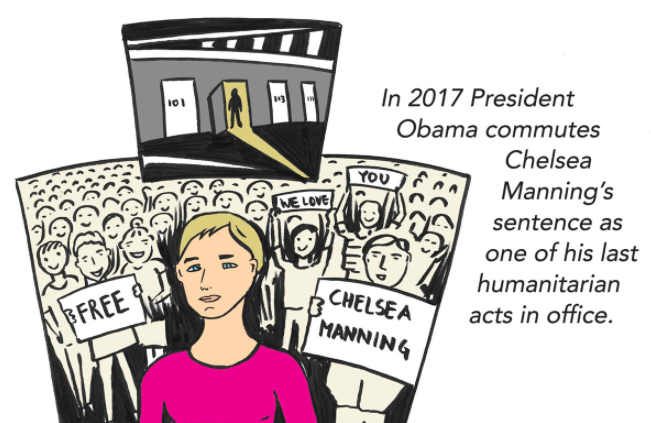“I keep fighting to warn the world of the dangerous trend in which the only information you can access is the kind that someone with money or power wants you to see.” Why I keep fighting – Chelsea Manning
Chelsea Manning is a transgender woman, transparency activist and acclaimed whistleblower.
She was sentenced in 2013 to serve 35 years in prison for disclosing military and diplomatic documents to WikiLeaks. On January 17, 2017, all but four months of her remaining prison sentence were commuted. She will now be released from prison on May 17, 2017 rather than in 2045.
 Chelsea Manning – Molly Crabapple
Chelsea Manning – Molly Crabapple
To celebrate her release, and reflect on the huge impact that her actions still have on today’s world, this post collects a list of articles about her case and years in prison. They have been written by Chelsea Manning herself as well as by others, who created platforms for her words to reach us when the system would have otherwise silenced them.
We might never be able to thank her enough for her work. But we can make sure to learn from her and make her words resonate, sharing them far and wide.
If you want to help her start her life after prison, please consider donating to the funding campaign organized by her family and friends. The donations received will be used to cover living and medical expenses during her first year in the world as a free woman.
Writings from the court and prison
In early 2010, Chelsea Manning leaked classified information to WikiLeaks, and was arrested in May that same year.
She put into the public domain a impressive load of previously secret digital information, including war logs from Afghanistan and Iraq, more than 250,000 US embassy cables from around the world, and official files on 765 Guantánamo detainees.
One of the most publicly known items included in the leak was a video showing a US aerial attack upon individuals in a Baghdad suburb. The video, published by WikiLeaks with the title Collateral Murder, caused international furore over the US military action in Iraq, and its relevance for the history of whistleblowing is still acknowledged years later.
She was sentenced to serve a 35-year sentence at the maximum-security U.S. Disciplinary Barracks at Fort Leavenworth.
She was not allowed to browse the web, and her access to print news and books was often harshly policed. She could only be visited by those who knew her pre-confinement, and not by journalists. However, in 2014 her words started to be published online, first on The Guardian, which she officially joined as contributing opinion writer a few months later, then on her blog. She also got a Twitter account, and used a voice phone to dictate to intermediaries, who then tweet on her behalf.
In spite of all the obstacles created to limit her access to communications channels, written words have been the most powerful tool for her to tell her story and share her thoughts, and for us to learn from her.
The following reading list includes articles, interviews and transcripts by Chelsea Manning, journalists who reported on her case, attorneys who worked with her, and friends who could visit her in prison.
The list includes publication dates to help navigate the timeline of the trial, sentence, and related events.
 Portrait of Chelsea Manning – Alicia Neal. Commissioned by the Chelsea Manning Support Network in 2014
Portrait of Chelsea Manning – Alicia Neal. Commissioned by the Chelsea Manning Support Network in 2014
United States v Pfc. Manning: Pfc. Manning’s Statement for the Providence Inquiry. February 2, 2013.
Chelsea Manning’s personal statement to the court at a pre-trial hearing. It includes her first official account of how she came to download hundreds of thousands of classified documents and videos from secure military databases and transmit them to the anti-secrecy website WikiLeaks.
On March 12, 2013, leaked audio of Chelsea Manning reading her statement was published by The Freedom of the Press Foundation.
Searchable database of the official record of trial (transcripts) and exhibits for the trial United States. v. Pfc. Manning – Alexa O’Brien.
“United States v. Pfc. Manning was conducted in de facto secrecy. The public was not granted contemporaneous access to court filings or rulings during her trial. In addition to reporting on her trial, I transcribed the proceedings, reconstructed the censored appellate list, and un-redacted any publicly available documentation, in order to foster public comprehension of her unprecedented trial.”
Dear Chelsea Manning: Birthday messages from Alan Moore, Birgitta Jónsdóttir, Edward Snowden, JM Coetzee, Joe Sacco, Lupe Fiasco, Michael Stipe, Molly Crabapple, Peter Tatchell, Billy Martin, Saul Williams, Slavoj Žižek, Terry Gilliam, Vivienne Westwood, Luke Harding. The Guardian. December 16, 2014.
 Detail from Happy Birthday, Chelsea Manning – Molly Crabapple
Detail from Happy Birthday, Chelsea Manning – Molly Crabapple
What happens to society in the absence of an alternative, counter-narrative to that of the national security state? – Alexa O’Brien, Center for Investigative Journalism, London. August 4, 2015.
Alexa O’Brien discusses the journalistic methods employed and the lessons learned covering censored and suppressed news, with a particular emphasis on the Chelsea Manning trial.
Double data – Joanne McNeil. January 14, 2015.
“Ultimately Manning’s whistleblowing revealed how power works. These are systems locked in place and in secret. That’s what the cables revealed. The empire is attenuated but secret. Secrecy is the fuel of its engine.”
Five years on, the WikiLeaks ‘Collateral Murder’ video matters more than ever – Christian Christensen, Common Dreams. April 4, 2015.
“If the content of the video illustrates the violent arrogance of power, then the leak of the video illustrates the potential power of dissent and courage.”
The years since I was jailed for releasing the ‘war diaries’ have been a rollercoaster – Chelsea Manning, The Guardian. May 27, 2015.
“In 2010, I was considerably less mature than I am now, and the potential consequences and outcomes of my actions seemed vague and very surreal to me. I certainly expected the worst possible outcome, but I lacked a strong sense of what “the worst” would entail. I did expect to be demonized and targeted, to have every moment of my life re-examined and analyzed for every possible personal flaw and blemish, and to have them used against me in the court of public opinion or against transgender people as a whole.”
Military haircuts. My first post about what it’s like to live, and grow as a human being: transitioning in a military prison – Chelsea Manning. October 7, 2015.
“I hope to use this platform as a place to document my experience and share my story and, maybe even begin a conversation. Going through such a seismic, existential shift in my life – transitioning in a military prison – presents real, meaningful, and daily challenges.”
Six years so far. What I have learned being in prison these last six years – Chelsea Manning. March 17, 2016.
“Act as your own filter for information. Search for your own answers to questions. If we rely on others to digest information for us, than we can’t say that we truly understand why we have done what we’ve done and where we will be going. We cannot, and will not, understand the world looking at information filtered through one lens.”
Solitary confinement is ‘no touch’ torture, and it must be abolished – Chelsea Manning, The Guardian. May 2, 2016.
“[…] conditions similar to the ones I experienced in 2010-11 are hardly unusual for the estimated 80,000 to 100,000 inmates held in these conditions across the US every day.
In the time since my confinement at Quantico, public awareness of solitary confinement has improved by orders of magnitude. People all across the political spectrum – including some who have never been in solitary or known anyone who has – are now beginning to question whether this practice is a moral and ethical one. […]
The evidence is overwhelming that it should be deemed as such: solitary confinement in the US is arbitrary, abused and unnecessary in many situations. It is cruel, degrading and inhumane, and is effectively a “no touch” torture. We should end the practice quickly and completely.”
Why I keep fighting. Chelsea Manning’s acceptance speech for the 2016 Blueprint Enduring Impact Whistleblowing Prize, May 9, 2016.
“I keep fighting to survive and thrive. […] I keep fighting to warn the world of the dangerous trend in which the only information you can access is the kind that someone with money or power wants you to see.
And, I keep fighting to let people know that they too can create change. By staying informed and educated, anyone can make a difference. You have the ability to fight for a better world for everyone — even for the most desperate, those at the bottom of the social ladder, refugees from conflict, queer and trans individuals, prisoners, and those born into poverty.”
Far from over. My Court Martial Appeal is only the beginning – May 20, 2016.
“Wednesday, we filed a brief appealing the conviction and sentence of my court martial in 2013.
It has taken my legal team — Nancy Hollander and Vincent Ward, of Freedman, Boyd, Goldberg Urias and Ward P.A., and US Army Captain David Hammond — nearly three years of hard work pouring over the tens of thousands of pages of transcript and court filings to put this magnum opus together. I would like to thank everyone who donated and showed their support over these years, it would not be possible without you.”
 Radical Love: Chelsea Manning – Heather Dewey-Hagborg
Radical Love: Chelsea Manning – Heather Dewey-Hagborg
xychelsea and xychelsea part 2 – Yan Zhu. May 25 and 26, 2016.
“[…] I looked at her as if I would never see her again, my heart sinking with the realization that there will probably never exist a photo of Chelsea Manning, age 28, for the world to see. It made me sad, because she looks nothing like any of the photos of her on the Internet. She looked like a hero, brighter and stronger than in all my memories, radiant with a light that makes no sense.”
“Chelsea is a former soldier, a celebrated whistleblower, a role model for millions of people around the world, a pioneer for transgender rights, and a hero who will be remembered forever in American history, but right now she is just a small figure in my arms, scared like the rest of us and wanting nothing more than to go home.”
The suppression of Chelsea Manning – Melissa Gira Grant, Pacific Standard. June 7, 2016.
“The panic around what Manning exposed — not what was contained in those files, but that there were so many — became twinned with the suspicions surrounding her identity. These were only magnified by how impossible it was at the time to know her.”
Seeing Chelsea – Chase Strangio. August 24, 2016.
ACLU attorney Chase Strangio represents Chelsea Manning in a lawsuit against the Pentagon for denying her access to treatment for gender dysphoria.
“One of the many things that Chelsea has lost through her incarceration is her ability to publicly shape the narrative of who she is. She writes beautifully and contributes to the public discourse on government accountability and transparency, trans rights, and justice for prisoners. But she is scrutinized and literally locked away and cut off from the world so her voice is always mediated through something or someone else. That doesn’t make her voice or her contributions less real but for a person as beautiful and thoughtful as Chelsea, these mediums don’t do her essence justice.”
Being Chelsea Manning – Melissa Gira Grant, Pacific Standard. October 12, 2016.
“Throughout her court martial, Manning was rendered nearly invisible and silent. Now serving her sentence, and speaking through her own writing and to the press, she faces ongoing threats of additional punishment.”
Free Chelsea Manning now – Chase Madar, Jacobin. January 13, 2017.
“Defending Manning and her leaks are not just a matter of goody-two-shoes principle but immense real-life consequences. The US invasion of Iraq was simply not possible but for government secrecy, distortion and lies. The architects of that dishonest war have escaped the slightest punishment, yet an on-the-ground private who tried to share her knowledge of that bloodbath is the one being severely punished.”
A case for Executive mercy for Chelsea Manning – Alexa O’Brien. January 14, 2017.
“Manning was a humanist soldier trapped between the cynical realities of warfare, her youth, and her characteristic earnestness – clinging onto the exigent hope that sanity and common sense would triumph if buttressed by knowledge and deliberation. Whether or not such an ideal is real or a fairytale remains to be seen. An act of mercy by the Executive, might evidence its display in our own imperfect experiment in self government. Manning isn’t perfect; neither is the U.S. Government. Can we all learn from these events and move on now?”

Detail from Suppressed Images – written by Heather Dewey-Hagborg and Chelsea Manning, illustrated by Shoili Kanugo
Incredible news: President Obama has commuted the sentence of whistleblower Chelsea Manning – Rainey Reitman, Trevor Timm, Freedom of the Press Foundation. January 17, 2017.
“[…] whistleblowers acting in the public interest should not be beholden to the president’s whims. Instead, fair laws should ensure strong protections for whistleblowers who shed light on human rights abuses, war crimes, corruption, and government deception.
[…] Until the Espionage Act is reformed and strong protections for whistleblowers are enacted, those who follow in Chelsea’s footsteps may face similar persecution.”
Looking back on 6 years of fighting for Chelsea Manning – Rainey Reitman. January 18, 2017.
“It boggles the mind to think how far we came with the Chelsea Manning Support Network. In some ways, we were squaring off against the United States government itself, with its seemingly infinite resources. As the trial dragged on for years, we had to fundraise for every dollar to cover legal fees, buy supplies to send mailings, and pay a pittance to a small group of overworked, dedicated, wonderful organizers who used every scrap of bravery and creativity imaginable to advance the public’s knowledge of Chelsea Manning.”
Chelsea Manning did the right thing. Finally, Barack Obama has too – Trevor Timm, The Guardian. January 18, 2017.
“Many publications have tried to list the many stories her revelations have contributed to over the years, but almost all have fallen short. The State and Defense documents that were leaked by Manning – originally to Wikileaks and published by the Guardian, New York Times and others – are to this day cited regularly in the nation’s largest newspapers. They provided historians and the public a view inside the US government’s machinations that we’ve never seen before. They even helped end the Iraq war.
In response, the government quite literally tried to destroy her. Although the government admitted that no one was harmed because of her disclosures, Chelsea suffered beyond what is imaginable for most people.”
Chelsea Manning’s attorneys: Obama’s commutation will help save life of jailed Army whistleblower – Democracy Now’s Amy Goodman interviews Nancy Hollander, Chelsea Manning’s appellate attorney, and Chase Strangio of the ACLU, representing her in a lawsuit against the Pentagon for denial of medical care. January 18, 2017.
“The secretary of defense at the time, Gates, said that the worst that happened was some embarrassment for the United States. There was not a single individual ever identified who was harmed by what Chelsea did. What Chelsea did actually helped the United States. It helped Americans. It helped people around the world understand about human rights violations, understand—bring war home to people. She wanted people to see what happens to somebody who gets killed, what happens to people in Iraq and Afghanistan. She wanted to make this real, so that we would stop doing these kinds of things to people. And so, what they’re saying is exactly the opposite of what Chelsea did. There has never been a single bit of evidence that anybody was harmed or that national security was harmed.”
A lawyer for Chelsea Manning explains what’s next after her life-saving commutation – Tyler Trykowski interviews ACLU attorney Chase Strangio, Vice. January 24, 2017.
“One of the general realities of incarceration is the way we dehumanize those we cage and lock away. We do that in a number of ways – by literally removing people from society, but in other administrative and emotional ways, too, by restricting people’s access to communication, to touch and intimacy – and that makes it much harder to perceive them as human beings. Which is, of course, the precise purpose of our punitive incarceration machine.
For Chelsea in particular, the government was very invested in taking away her voice and making her a symbol and an example to justify its incredibly cruel treatment of her. As advocates working with her, one challenge was finding ways to help her tell her story on her own terms, and be experienced as a human being by the public. Even listening to reactions from the media last week, nobody has any idea who she is, and, most frankly, have no idea what her case is about. […]
These are things about her that so few people realize or know – her motivations for service, her dedication to country, and the systemic discrimination she experienced as a low-income queer and trans person.
During these last three years, she has been able to write some and share her story, and we were able to help her with her Twitter account and things like that. But she hasn’t been seen, you know? In so many ways – not just visually.”
If you want to donate to the Chelsea Manning Welcome Home Fund, please do so through the official campaign page.
To learn more about Chelsea Manning, check out her Twitter and Medium pages.